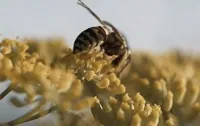Active ingredient in
Monsanto’s
Roundup hurts honey bee guts
 Honey bees exposed to levels of glyphosate commonly found in the
environment had decreased amounts of microbiota in their gut—which leaves them
prone to early death, according to a study released today.
Honey bees exposed to levels of glyphosate commonly found in the
environment had decreased amounts of microbiota in their gut—which leaves them
prone to early death, according to a study released today.
Honey bees' health is directly tied to the helpful organisms in
their gut. These "microbiota" help the bees' metabolism, weight gain
and immune system.
The new findings go against previous claims that glyphosate — the active ingredient in Bayer's Monsanto Roundup weedkiller — does not harm wildlife, and offers another possible clue as to why honey bee colonies are dying at an increased rate.
The new findings go against previous claims that glyphosate — the active ingredient in Bayer's Monsanto Roundup weedkiller — does not harm wildlife, and offers another possible clue as to why honey bee colonies are dying at an increased rate.
"Gut microbiota is involved in nutrition for bees, helping break down components of cell walls in pollen grains and protecting against different pathogens," Nancy Moran, senior author of the study and evolutionary biologist at the University of Texas, told EHN.
She and colleagues published the study today in the Proceedings of
the National Academy of Sciences (PNAS).
The researchers collected hundreds of honey bees from a single
hive and exposed some of them to levels of glyphosate commonly found in the
environment, and then returned them to the hive. After three days, the total
gut bacteria already decreased in the treated bees.
When treated bees were exposed to a harmful pathogen, they were more likely to die if they had the reduced microbiota in their gut.
When treated bees were exposed to a harmful pathogen, they were more likely to die if they had the reduced microbiota in their gut.
They repeated the experiment with other hives and bees and saw the
same impacts.
More pollinator problems
It was previously thought that glyphosate was harmless to bees
since it targets an enzyme usually found only in plants and
microorganisms—however, bee gut bacteria contain that same enzyme, Moran said.
"It's true the bee itself has no molecular targets from glyphosate but its
gut bacteria do have targets," she said. "It's similar to humans
taking antibiotics where there can be trouble if you upset the normal
microbiota."
She said honey bees are relatives to bumble bees and share similar
gut microbiota. So, glyphosate is bad for bumble bees as well.
The experiment is concerning as the value of insect pollination to
U.S. farming is about $16 billion a year, and honey bee colonies — and
pollinators in general — are in trouble.
A third of our food relies on pollinators, and while honey bees
are one of many species that pollinate, the U.S. Department of Agriculture
estimates about a 30 percent overwinter colony loss annually for honey
bees over the past decade.
Over the past year, the Bee Informed Partnership, a nonprofit
working with beekeepers, research labs and universities to better understand
honey bee declines in the U.S., estimated beekeepers lost 40 percent of their managed colonies.
The culprits for the colony collapses are unclear: Researchers
have previously pointed to diseases, parasites, habitat loss, pesticides, and a
combination of all of these stressors.
Latest Monsanto woe
Glyphosate is the world's most heavily used herbicide. More than
3.5 billion pounds have been applied in the U.S. alone over the past four
decades—two-thirds of which were applied over the past decade, according to a
2016 study.
Moran said the new study isn't enough evidence to say if
glyphosate is having population level impacts on the honey bees, "but
there really is a lot of [glyphosate] in both agricultural and urban
areas," she said.
"At the moment, there are no guidelines that you should avoid
spraying glyphosate on or near bees, since it's considered completely
innocuous," she added.
The study is the latest blow to Monsanto's popular weedkiller. The
company was ordered to pay a $289 million award last month to a former
groundskeeper with terminal cancer who said Roundup exposure gave him the
illness. The company is now fighting that ruling.
However, the agribusiness is facing an estimated 8,000 similar
lawsuits.